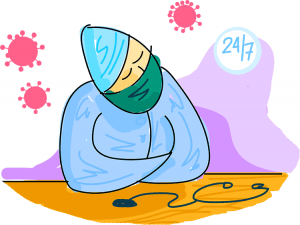6 years ago · admin · Comments Off on Helping frontline workers cope with stress during COVID-19: actions for team leads
Helping frontline workers cope with stress during COVID-19: actions for team leads

Going to work during the COVID-19 pandemic has placed front-line workers under immense and unprecedented pressures, putting their physical, mental and social well-being at risk. Staff under excessive or prolonged stress become more prone to frequent absence from work or reduced productivity while at work, accidents and mistakes. In the COVID-19 pandemic, this may mean compromised quality and safety of care, breach of protocols and guidelines, increased risk of infections, and compromised capacity of the health system and emergency response teams to fight the pandemic.
While front-line workers have the responsibility of caring for themselves and verbalising their needs and concerns, many of the efforts to prevent and reduce stress and care for mental health of front-line workers must be made by organisations, managers and health administrators.
Five steps to a mentally healthy workplace
Step 1: Show your commitment
– Declare that mental health is a priority to your organisation, starting from the very top.
Step 2: Assess the situation
– Start by assessing the work stressors and mental health needs in the workplace.
Step 3: Make an action plan
– Translate your assessment into a reasonable and practical action plan with set targets and clear indicators to measure progress.
Step 4: Implement and evaluate
– Put your plan to action with clear milestones and targets.
Step 5: Learn and mainstream
– Use regular evaluations to make the needed adjustments. Mainstream your mental health action plan into a clear written policy.
Actions team leads can take to help front-line workers cope with stress during COVID-19
Prepare them for the job
– They must have a clear understanding of their own roles and responsibilities.
– Adequate training must be provided on occupational health and safety topics (e.g. use of Personal Protective Equipment and Infection Protection and Control measures as well as technical training needed to perform their duties (e.g. the latest guidelines and procedures for assessing, triaging and treating patients).
Help them care for themselves
– Provide them with information on stress, how to maintain a healthy lifestyle, and when to seek further support.
– Equip them with tools and techniques for self-care and stress management and encourage workers to practice these healthy coping strategies regularly.
Protect them on the job
– Provide front-line workers with sufficient Personal Protective Equipment and Infection Protection and Control supplies to protect themselves from infection.
– Protect them from incidents of harassment and violence, including physical as well as legal protection.
– Protect and uphold their rights.
Create a healthy work environment
– Tackle the sources of stress by ensuring appropriate work hours and workload, sufficient breaks between shifts, and that tasks are well-matched to skills and experience-level.
– Consider rotating staff between high-stress and low-stress tasks to distribute pressures.
– Give workers access to the tools they need to deliver safe and high-quality care or services.
– Use regular written communications and team meetings to check-in with workers and keep them up to date with the latest technical tools and guidelines or other pertinent information.
– Use these meetings to also foster team cohesion, and allow front-line workers to voice their concerns or needs, or participate in decision-making in a meaningful way.
Be a good role model
– Adhere to health and safety guidelines.
– Practice healthy coping strategies by taking work breaks, demonstrating healthy habits (diet, hydration, physical activity) and avoiding the use of tobacco, alcohol or other substances.
– Set the tone by caring for yourself. Maintain a healthy work-life balance and practice the stress-management and relaxation techniques that are recommended.
Encourage peer support
– Create a formal or informal platform where peers can share knowledge and provide basic psycho-social support through peer networks, under the supervision of mental health and psycho-social support professionals.
– Establish a buddy-system that allows pairing of inexperienced front-line workers with their more experienced workers, thus providing professional support.
Be perceptive and supportive
– Familiarise yourself with the signs and symptoms of stress and burnout, and practice active listening and supportive communication when you approach the front-line workers you are concerned about.
– Pay extra attention to front-line workers who have pre-existing physical or mental health conditions or disabilities, who are facing challenges in their personal lives and those who lack social support.
Give feedback and recognition
– Give front-line workers constructive feedback on their work, highlighting their good performance and opportunities to improve.
– Show appreciation for hard work, and give public recognition to teams and individuals for their service. Small gestures and rewards can go a long way in boosting confidence and staff morale.
Make services available
– Make sure further mental health and psycho-social support services are available for front-line workers who need them, and that they are aware that they can access services confidentially.
– Front-line workers need to also have access to mental health care facilities in case of crisis situations, and psychotropic medications need to be made available to them if they are needed.
Note: This article was shared by World Health Organisation (WHO). Original link is attached below.

